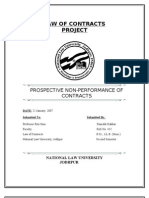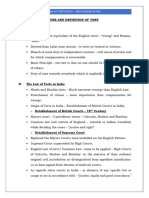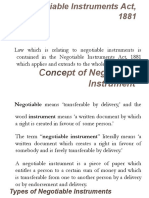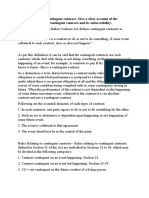0 ratings0% found this document useful (0 votes)
114 viewsFMS - Performance and Discharge of Contract
FMS - Performance and Discharge of Contract
Uploaded by
kushalThis document discusses various ways that a contract can be discharged through performance or attempted performance. It explains that actual performance occurs when all parties fulfill their contractual obligations, while tender or attempted performance allows a party to discharge their liability if they offer to perform in accordance with the contract terms but the other party refuses. It also outlines rules regarding who can perform contracts, demand performance, the order of performance for reciprocal promises, and how default of an initial promise affects the obligations of the parties. The document provides examples to illustrate these concepts and legal principles related to discharge of contracts through performance.
Copyright:
© All Rights Reserved
Available Formats
Download as PPTX, PDF, TXT or read online from Scribd
FMS - Performance and Discharge of Contract
FMS - Performance and Discharge of Contract
Uploaded by
kushal0 ratings0% found this document useful (0 votes)
114 views14 pagesThis document discusses various ways that a contract can be discharged through performance or attempted performance. It explains that actual performance occurs when all parties fulfill their contractual obligations, while tender or attempted performance allows a party to discharge their liability if they offer to perform in accordance with the contract terms but the other party refuses. It also outlines rules regarding who can perform contracts, demand performance, the order of performance for reciprocal promises, and how default of an initial promise affects the obligations of the parties. The document provides examples to illustrate these concepts and legal principles related to discharge of contracts through performance.
Original Description:
DASDD
Original Title
FMS- Performance and Discharge of Contract
Copyright
© © All Rights Reserved
Available Formats
PPTX, PDF, TXT or read online from Scribd
Share this document
Did you find this document useful?
Is this content inappropriate?
This document discusses various ways that a contract can be discharged through performance or attempted performance. It explains that actual performance occurs when all parties fulfill their contractual obligations, while tender or attempted performance allows a party to discharge their liability if they offer to perform in accordance with the contract terms but the other party refuses. It also outlines rules regarding who can perform contracts, demand performance, the order of performance for reciprocal promises, and how default of an initial promise affects the obligations of the parties. The document provides examples to illustrate these concepts and legal principles related to discharge of contracts through performance.
Copyright:
© All Rights Reserved
Available Formats
Download as PPTX, PDF, TXT or read online from Scribd
Download as pptx, pdf, or txt
0 ratings0% found this document useful (0 votes)
114 views14 pagesFMS - Performance and Discharge of Contract
FMS - Performance and Discharge of Contract
Uploaded by
kushalThis document discusses various ways that a contract can be discharged through performance or attempted performance. It explains that actual performance occurs when all parties fulfill their contractual obligations, while tender or attempted performance allows a party to discharge their liability if they offer to perform in accordance with the contract terms but the other party refuses. It also outlines rules regarding who can perform contracts, demand performance, the order of performance for reciprocal promises, and how default of an initial promise affects the obligations of the parties. The document provides examples to illustrate these concepts and legal principles related to discharge of contracts through performance.
Copyright:
© All Rights Reserved
Available Formats
Download as PPTX, PDF, TXT or read online from Scribd
Download as pptx, pdf, or txt
You are on page 1of 14
Performance and Discharge of Contract
(Section 37-67)
The most natural and usual mode
of discharging a contract is to
perform it in accordance with its
terms.
Performance of contract means that
both the parties - promisor and the
promisee have fulfilled their
respective
obligations,
which
the
contract placed upon them. (Sec. 37)
Case: A visits a stationery shop to
buy a calculator. The seller delivers
the instrument and A pays the
price. The contract is said to have
discharged
by
mutual
performance.
Types of Performance
Performance may be actual or attempted.
Actual Performance. When a promisor to a
contract has fulfilled his obligation in accordance
with the terms of the contract, the promise is said to
have been actually performed. Actual performance
gives a discharge to the contract and the liability of
the promisor ceases to exist.
A agrees to deliver 10 bags of cement at Bs
factory and B promises to pay the price on
delivery. A delivers the cement on the due date
and B makes the payment.
Attempted Performance. When the performance has
become due, it is sometimes sufficient if the promisor
offers to perform his obligation under the contract. This
offer is known as attempted performance or more
commonly as tender. Thus, tender is an offer of
performance, naturally, complies with the terms of the
contract. If goods are tendered by the seller and refused
by the buyer, the seller is discharged from further liability,
given that the goods are in accordance with the contract
as to quantity and quality and he may sue the buyer for
breach of contract if he so desires.
(Sec.38)
A contracts to deliver to B at his warehouse, on
March 6, 2004, 100 tons of basmati rice. A takes the
goods to Bs place on the due date during business
hours, but B, without assigning any good reason,
refuses to take the delivery. Here, A has performed
what he was required to perform under the
contract. It is a case of tender of performance and A
To be a valid tender or offer of performance, it
must fulfil the following conditions:
(i) It must be unconditional [Sec. 38(1)].
(ii) It must be made at a proper time and place
[Sec. 38(2)].
(iii)
It must be made under such circumstances
that the person to whom it is made may have a
reasonable opportunity of ascertaining that the
person by whom it is made is able and willing, and
then do the whole of what he is bound by his
promise to do [Section 38(2)].
(iv) If the offer is an offer to deliver anything to
the promisee, the promisee must have a
reasonable opportunity of seeing that the thing
offered is the thing that the promisor is bound by
his promise to deliver [Sec. 38(3)].
BY WHOM CAN CONTRACTS BE PERFORMED?
1. Promisor himself. If it appears from the nature of
the any case that it was the intention of the contracting
parties to any contract that any promise contained in it
the contract should be performed by the promisor
himself, such a promise must be performed by the
promisor himself. [Sec. 40]
2. Agent. Where personal consideration is not the
subject matter of the contract, the promisor or his
representatives may employ a competent person to
perform it. [Section 40].
A promises to pay B a sum of money. A may
perform this promise, either by personally paying
the money to B or by causing it to be paid to B by
another; and, if A dies before the time appointed
for payment, his representatives must perform the
promise, or they may employ some proper person
to do so.
3. Legal Representative. by the representatives.
Promises bind the representatives of the promisors,
including in case of the death of such promisors before
performance, unless a contrary intention an exemption
to that effect is stated in the appears from the contract
itself. However, contracts of personal nature, it comes
to an end should the promisor dies and therefore such
contracts cannot be performed
4.Third
person.
When
a
promisee
accepts
performance of the promise from a third person, he
cannot afterwards enforce it against the promisor.
[Sec. 41]
5. Joint Promisors. When two or more persons have
made a joint promise, then, unless a contrary intention
appears by the contract, all such persons, during their
joint lives, and, after the death of any of them, his
representative jointly with the survivor or survivors,
and, after the death of the last survivor, the
WHO CAN DEMAND PERFORMANCE?
Ordinarily, it is only the promisee who can demand performance of
the promise under a contract. This is simply because a stranger to
contract cannot sue and the person who can demand performance
is the party to whom the promise is made. In other words a third
party cannot demand performance of the contract even if it was
made for his benefit. A promises B to carve the statute of C, father
of B. The person who can demand performance is B and not C.
In the event of the death of the promisee, his legal representative
can demand performance unless a contrary intention appears In the
contract. However, this is not possible if the contract is of personal
nature.
[Section 37]
Moreover, in case of a joint promise, the promisee may, in the
absence of express agreement to the contrary, compel any one or
more of the joint promisors to perform the entire promise. [Section 43]
The time and place of performance are the matters to be
determined by agreement between the parties to the contact.
General rules regarding the same are as under:
Where no time is specified: A contract is not bad for want of
certainty if time for performance is not stated. Where the time for
performance is not specified in the contract, the promise must be
performed within a reasonable time. The question "What is a
reasonable time is, in each particular case, a question of fact.
(Sec. 46)
Where time is specified: When a contract specifies the time and
place for its performance, the parties must perform accordingly.
But, when the contract is to be performed on a certain day, and
the promisor has undertaken to perform without a request from
the promisee, he may perform it at any time during the usual
business hours on that day at the specified place.
(Sec. 47)
PERFORMANCE OF RECIPROCAL PROMISES:
LEGAL RULES
1. Promisor not bound to perform unless promisee
ready and willing A Promisor is not bound to perform,
unless the promisee reciprocates and is ready and willing
to perform his part of the contract. [Sec. 51]
A and B contract that A shall deliver goods to B to be
paid for by B on delivery. A need not deliver the goods,
unless B expresses readiness and willing to pay for the
goods on delivery. B need not pay for the goods, unless A
is ready and willing to deliver them on payment.
2. Order of performance of reciprocal promises.
Where the order in which reciprocal promises are to be
performed is expressly fixed by the contract, they shall be
performed in that order; and, where the order is not
expressly fixed by the contract, they shall be performed in
that order which the nature of the transaction requires.
[Sec. 52]
3. Liability of party preventing event on which
the contract is to take effect. When a contract
contains reciprocal promises, and one party to the
contract prevents the other from performing his promise,
the contract becomes voidable at the option of the party
so prevented; and it is entitled to compensation from the
other party for any loss which it may sustain in
consequence of the non-performance of the contract.
[Sec.53]
A and B contract that B shall execute certain work
for A for Rs 1,000. B is ready and willing to
execute the work accordingly, but A prevents him
from doing so. The contract is voidable at the
option of B; and, if he decides to rescind it, he is
entitled to recover compensation from A for any
loss which he has incurred due to the non-
4.Effect of default as to that promise which
should be first performed. When a contract
consists of reciprocal promises, such that one of them
cannot be performed, or that its performance cannot be
claimed till the other has been performed, and the promisor
of the promise last mentioned fails to perform it, such
promisor cannot claim the performance of the reciprocal
promise, and must make compensation to the other party
to the contract for any loss which it may sustain by the nonperformance of the contract.
[Sec. 54]
A hires B's ship to dispatch a cargo from Kolkata to
Mauritius. The cargo is to be provided by A, while B
is to receive a certain freight for its conveyance. A
does not provide any cargo for the ship. A cannot
claim the performance of B's promise, and must
make compensation to B for the loss which B
Discharge of a contract: implies termination of
contractual obligations. This is because when
the parties originally entered into the contract,
the rights and duties in terms of contractual
obligations were set up. Consequently when
those rights and duties are put out then the
contract is said to have been discharged. Once
a contract stands discharged, parties to it are
no more liable even though the obligations
under the contract remain uncompleted.
Novation or Alternation of Contract.
The term novation implies the substitution of a
new
contract
for the original one. This
arrangement may be either between the same
parties or between different parties. For a
novation to be valid and effective, the consent
of all the parties, including the new one(s), if
any, is essential. Moreover, the subsequent or
second agreement must be one capable of
enforcement in law, the consideration for
which is the exchange of promises not to
enforce the original contract. (Sec.62)
You might also like
- Prospective Non-Performance of ContractsDocument21 pagesProspective Non-Performance of ContractskackbikeNo ratings yet
- ContracrtDocument11 pagesContracrtroushan kumarNo ratings yet
- Breach of Contract Problem Question and SolutionDocument5 pagesBreach of Contract Problem Question and SolutionGovnyoNo ratings yet
- Bailment ContractsDocument4 pagesBailment ContractsBilawal Mughal100% (1)
- Discharge of ContractDocument17 pagesDischarge of ContractatreNo ratings yet
- Discharge of ContractDocument7 pagesDischarge of ContractAnayta SharmaNo ratings yet
- Contracts PDFDocument14 pagesContracts PDFKaran MishraNo ratings yet
- Condition and WarrantyDocument3 pagesCondition and Warrantyjerry zaidiNo ratings yet
- Cases On Discharge of ContractDocument5 pagesCases On Discharge of ContractVIVEKNo ratings yet
- Ubi Jus Ibi Remedium - Where There Is A Right, There Is A RemedyDocument8 pagesUbi Jus Ibi Remedium - Where There Is A Right, There Is A RemedymonekaNo ratings yet
- Instantaneous ContractsDocument19 pagesInstantaneous ContractsParikshit100% (1)
- Void AgreementsDocument11 pagesVoid AgreementsSatyam Kr SinghNo ratings yet
- Notes ConsiderationDocument5 pagesNotes Consideration3D StormNo ratings yet
- Agency in Law of ContractDocument11 pagesAgency in Law of ContractYash Vardhan SinghNo ratings yet
- Offer AcceptanceDocument11 pagesOffer AcceptanceRahull DandotiyaNo ratings yet
- Notes Ica and SogaDocument38 pagesNotes Ica and SogahaloXDNo ratings yet
- Discharge of ContractDocument8 pagesDischarge of ContractRubeya RashidNo ratings yet
- Chapter 9 Performance and Discharge of ContractDocument17 pagesChapter 9 Performance and Discharge of ContractSahil PatekarNo ratings yet
- Contract of GuaranteeDocument9 pagesContract of Guaranteedee deeNo ratings yet
- Rights of Surety FDDocument19 pagesRights of Surety FDMuskan SharanNo ratings yet
- Law of Banking Notes w2-3Document52 pagesLaw of Banking Notes w2-3DeborahNo ratings yet
- Essential Elements of ContractDocument48 pagesEssential Elements of ContractGeetanjali AlisettyNo ratings yet
- Contract of GuaranteeDocument6 pagesContract of GuaranteeKumari PiyaNo ratings yet
- Types of Contracts: Presented by Arathy VikramDocument24 pagesTypes of Contracts: Presented by Arathy VikramArathy VikramNo ratings yet
- Revocation of Offer and AcceptanceDocument1 pageRevocation of Offer and Acceptancearidaconcept0% (1)
- Legality of Object & ConsiderationDocument26 pagesLegality of Object & Considerationjjmaini13100% (1)
- Contract of GuaranteeDocument66 pagesContract of Guaranteemalavikasa19100% (1)
- VOID AGREEMENTS Expressly DeclaredDocument3 pagesVOID AGREEMENTS Expressly DeclaredBharathi Priya.SNo ratings yet
- Indemnity BondDocument1 pageIndemnity BondIshaq KhanNo ratings yet
- Law of Torts Notes - Prof Bhoomi KatiraDocument80 pagesLaw of Torts Notes - Prof Bhoomi KatiraTanveer Singh NarulaNo ratings yet
- Guarantee For Past DebtDocument12 pagesGuarantee For Past DebtRaj KrishnaNo ratings yet
- ContractsDocument15 pagesContractsYashodhan NighoskarNo ratings yet
- The Negotiable Instruments Act 1881Document16 pagesThe Negotiable Instruments Act 1881vivekNo ratings yet
- Law of Contract 2Document22 pagesLaw of Contract 2Ajay Dalal DalalNo ratings yet
- Indemnity and Guarantee BbaDocument11 pagesIndemnity and Guarantee BbaTanureema DebNo ratings yet
- Partnership - Case Law - LLBDocument87 pagesPartnership - Case Law - LLBJasmine KaurNo ratings yet
- Contracts Case Laws 1st SemesterDocument15 pagesContracts Case Laws 1st Semesteryashovardhan singhNo ratings yet
- Meaning and Nature of The Law of Torts Law of Torts: A Project ONDocument15 pagesMeaning and Nature of The Law of Torts Law of Torts: A Project ONAASHISH VERMANo ratings yet
- Liability of SuretyDocument8 pagesLiability of SuretyLucy RajNo ratings yet
- All Contracts Are Agreement But All AgreDocument16 pagesAll Contracts Are Agreement But All AgreManish Dubey0% (1)
- Consideration & ObjectDocument23 pagesConsideration & ObjectMaryam MalikNo ratings yet
- 1.1 Nature of ContractDocument55 pages1.1 Nature of ContractvanshikaNo ratings yet
- Contract and Quasi ContractDocument13 pagesContract and Quasi ContractAmanNo ratings yet
- No Fault LiabilityDocument7 pagesNo Fault LiabilityGiridharManiyedathNo ratings yet
- Remoteness of Damages Meaning and ConceptDocument4 pagesRemoteness of Damages Meaning and ConceptRanjan BaradurNo ratings yet
- Contingent ContractDocument3 pagesContingent ContractGarvitNo ratings yet
- Introduction To Consumer Protection Act, 1986Document7 pagesIntroduction To Consumer Protection Act, 1986arijit9876100% (2)
- Doctrine of Ultra ViresDocument4 pagesDoctrine of Ultra ViresdivyaabaskaranNo ratings yet
- Quasi ContractDocument7 pagesQuasi Contractlavanya2401No ratings yet
- Resolution of Disputes NotesDocument114 pagesResolution of Disputes NotesV.Vidhya VasiniNo ratings yet
- Law of Torts Unit 2Document15 pagesLaw of Torts Unit 2Laiba EqraNo ratings yet
- Adoption and Guardianship (Uj VS)Document21 pagesAdoption and Guardianship (Uj VS)Prem ChopraNo ratings yet
- Discharge of Contract by ImpossibilityDocument22 pagesDischarge of Contract by Impossibilityrishav anandNo ratings yet
- Symbiosis International University: Law of ContractsDocument9 pagesSymbiosis International University: Law of ContractsSanmati Raonka100% (1)
- 128 SuretyDocument11 pages128 SuretyNitya Nand Pandey100% (1)
- Difference Between Contract of Indemnity and Contract of Guarantee: Ten Case AnalysisDocument11 pagesDifference Between Contract of Indemnity and Contract of Guarantee: Ten Case AnalysisSimranNo ratings yet
- Judiciary Notes - ContractDocument10 pagesJudiciary Notes - ContractYash SinghNo ratings yet
- Listen. Think. Act.: Lessons and Perspectives in Community DevelopmentFrom EverandListen. Think. Act.: Lessons and Perspectives in Community DevelopmentNo ratings yet
- Chapter 9 - Performance and Discharge of ContractDocument18 pagesChapter 9 - Performance and Discharge of ContractSachin MishraNo ratings yet
- NH7306363906304Document3 pagesNH7306363906304kushalNo ratings yet
- Spectrum of Histomorphological Diagnosis in Cystoscopic Bladder BiopsiesDocument4 pagesSpectrum of Histomorphological Diagnosis in Cystoscopic Bladder BiopsieskushalNo ratings yet
- Ilovepdf MergedDocument119 pagesIlovepdf Mergedkushal100% (1)
- Correlation of Visual Inspection With Cytological and Histopathological Findings in Cervical NeoplasiaDocument4 pagesCorrelation of Visual Inspection With Cytological and Histopathological Findings in Cervical NeoplasiakushalNo ratings yet
- Clinicopathological Correlation of Endometrial, Myometrial and Ovarian Pathologies With Secondary Changes in LeiomyomaDocument5 pagesClinicopathological Correlation of Endometrial, Myometrial and Ovarian Pathologies With Secondary Changes in LeiomyomakushalNo ratings yet
- Cervical Pap Smear-A Prospective Study in A Tertiary HospitalDocument4 pagesCervical Pap Smear-A Prospective Study in A Tertiary HospitalkushalNo ratings yet
- FMS Class Case Discussion 2Document3 pagesFMS Class Case Discussion 2kushalNo ratings yet
- FMS Nia PPT 3Document11 pagesFMS Nia PPT 3kushalNo ratings yet
- Ap 11 HalfDocument4 pagesAp 11 HalfalcantaraaivanaNo ratings yet
- Is 2585 2006Document12 pagesIs 2585 2006Raja NarenderNo ratings yet
- Audit - List of Important QuestionsDocument4 pagesAudit - List of Important QuestionschakrabortydipanjantintinNo ratings yet
- As 1928-2001 Child-Resistant PackagesDocument8 pagesAs 1928-2001 Child-Resistant PackagesSAI Global - APACNo ratings yet
- M A C L: Competition Law ProjectDocument31 pagesM A C L: Competition Law ProjectSwati KritiNo ratings yet
- 000-ZA-E-009712 - 00 HSE Requirement For Subcontractor and VendorsDocument129 pages000-ZA-E-009712 - 00 HSE Requirement For Subcontractor and Vendorszizu1234No ratings yet
- Case Digest: PCGG V Sandiganbayan: Home 2013 JulyDocument3 pagesCase Digest: PCGG V Sandiganbayan: Home 2013 JulyThereseSunicoNo ratings yet
- Consumer Protection ActDocument15 pagesConsumer Protection ActsamairaNo ratings yet
- NDADocument3 pagesNDACarlo OaniaNo ratings yet
- PSV Term SheetDocument25 pagesPSV Term SheetAnonymous O3q6kIRJNo ratings yet
- Arranza Vs BF HOMES - ReceivershipDocument2 pagesArranza Vs BF HOMES - ReceivershipEuwzzelle Barpinkxz Lim TalisicNo ratings yet
- Should Domestic Workers Be Considered An Industry' Under Ida, 1947 ?Document6 pagesShould Domestic Workers Be Considered An Industry' Under Ida, 1947 ?srushti mandadeNo ratings yet
- Protection of Economic Reforms Act 1992 PDFDocument3 pagesProtection of Economic Reforms Act 1992 PDFHaseeb JavidNo ratings yet
- Starr Weigand: Labor I Cadiz 1Document68 pagesStarr Weigand: Labor I Cadiz 1Miel StarrNo ratings yet
- Letter of Agreement: Lnd1-3 SampleDocument8 pagesLetter of Agreement: Lnd1-3 SampleJohnjohn MateoNo ratings yet
- Iocl TenderDocument22055Document769 pagesIocl TenderDocument22055dineshhindujaNo ratings yet
- Dual Banking System in IndonesiaDocument38 pagesDual Banking System in IndonesiaSyifaNo ratings yet
- PCC Commission Decision No. 15-M-010-2020Document3 pagesPCC Commission Decision No. 15-M-010-2020purplebasketNo ratings yet
- York Town FinaleDocument30 pagesYork Town FinaleFarisya Fadzil100% (1)
- Law of ContractDocument4 pagesLaw of ContractRadzman Bin MohamedNo ratings yet
- Statement 26jun2020Document2 pagesStatement 26jun2020badral KhaidavNo ratings yet
- Monzo Bank StatementDocument1 pageMonzo Bank Statementsairaalipay869No ratings yet
- Datacenter FMS RFPDocument137 pagesDatacenter FMS RFPParichoy GuptaNo ratings yet
- Basel 1Document18 pagesBasel 1Choreo SiblingsNo ratings yet
- Prudential Practice Guide LPG 232 Business Continuity ManagementDocument8 pagesPrudential Practice Guide LPG 232 Business Continuity Managementa cNo ratings yet
- S$54.9m Acquisition: Sheng Siong GroupDocument7 pagesS$54.9m Acquisition: Sheng Siong Groupanahita_agarwalNo ratings yet
- PPMO Standar Bidding DocumentDocument71 pagesPPMO Standar Bidding DocumentMJ KarkiNo ratings yet
- CC Notes Arts. 37-47Document4 pagesCC Notes Arts. 37-47chrisNo ratings yet
- Marcia Brady Tucker and Estate of Carll Tucker, Deceased, Marcia Brady Tucker, Carll Tucker, JR., and Luther Tucker, Executors v. Commissioner of Internal Revenue, 322 F.2d 86, 2d Cir. (1963)Document5 pagesMarcia Brady Tucker and Estate of Carll Tucker, Deceased, Marcia Brady Tucker, Carll Tucker, JR., and Luther Tucker, Executors v. Commissioner of Internal Revenue, 322 F.2d 86, 2d Cir. (1963)Scribd Government DocsNo ratings yet
- Amity Business School: Legal Aspects of BusinessDocument40 pagesAmity Business School: Legal Aspects of BusinessAnkit JainNo ratings yet

































































































